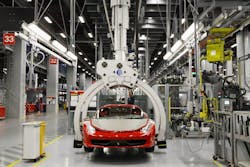Biggest Italian Factory Slump Since 2014 Hits Euro Economy
Italian manufacturing shrank the most in almost four years in October, hinting at continued weakness after the economy failed to grow in the third quarter.
IHS Markit’s factory index for the country dropped below the key 50 mark, meaning a contraction -- the first since August 2016.
Output shrank for a third month and new orders fell as optimism took a knock from slower global demand and “worries over political stability.”
The euro-area manufacturing PMI slid to 52.0, below the initial estimate of 52.1 and the weakest reading in more than two years.
The figures are another blow to Italy after last quarter’s stagnation, led by industry. Amritpal Virdee, an economist at IHS Markit said the sector may drag down wider economic growth again this quarter.
Italy’s populist government says the slump makes their expansionary fiscal plan even more necessary, even as critics fret about the country’s huge debt pile. The administration intends to stick to its controversial budget plans despite criticism from the European Union and the country’s central bank.
The PMIs continue a run of disappointing figures in the euro area, and add to concerns that the global economy is cooling. Average growth in the currency bloc was slower than expected in the third quarter, and measures of confidence since then have slipped lower.
In Germany, where the economy probably stalled in the third quarter, the manufacturing PMI for October also fell to the lowest in more than two years. Similar slumps were seen in the Netherlands, France and Austria.
The readings increase pressure on the European Central Bank to explain whether it still intends to cap its bond-buying program at the end of the year. Officials will meet on Dec. 13 to set policy and review fresh economic forecasts.
“Growing risk aversion, linked in turn to worries about the global economic environment, trade-war worries, political uncertainty and rising prices appears to be hitting demand for a wide variety of goods,” said Chris Williamson, chief business economist at IHS Markit.
By Fergal O'Brien
About the Author
Bloomberg
Licensed content from Bloomberg, copyright 2016.
